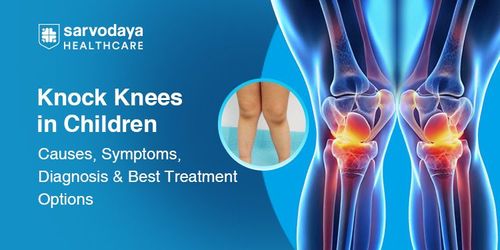Overview
Knocke knees, medically known as genu valgum, is a condition where the knees angle inward and touch each other while the ankles remain apart. It is commonly seen in children but can also affect adults due to injuries, bone deformities, or nutritional deficiencies.
At Sarvodaya Hospital’s Centre for Paediatric Orthopaedics, our experts provide advanced diagnosis and corrective treatments for children. With a combination of physiotherapy, bracing, and surgical correction where required, we focus on restoring proper leg alignment, improving gait, and preventing long-term joint complications under the care of skilled paediatric orthopaedic surgeons.
Why is Knocked Knees Treatment Required?
Treatment for knocked knees is essential when the condition causes pain, difficulty in walking, or joint strain. In children, it may develop naturally and correct over time, but persistent deformity requires medical evaluation.
Common knocked knees causes include bone growth abnormalities, rickets (vitamin D deficiency), injury, infection, or obesity. In adults, it can result from arthritis or previous fractures affecting leg alignment.
At Sarvodaya Hospital, treatment aims to correct the deformity, relieve knee pain, and prevent early-onset osteoarthritis. For children, early knock-knee treatment for child through guided growth techniques ensures proper bone development and long-term mobility.
Procedure / Treatment Approach
At Sarvodaya Hospital, the treatment approach for knocked knees depends on the patient’s age, severity of the deformity, and underlying cause. Our paediatric orthopaedic surgeons follow a structured plan that begins with a comprehensive clinical assessment and diagnostic imaging such as X-rays, gait analysis, and blood tests (to rule out vitamin or metabolic deficiencies).
- Non-Surgical Management (Common in Children):
- Physiotherapy & Exercise Programs: Specific strengthening and stretching routines help align the legs and support joint stability. Parents are guided on how to fix knocked knees at an early stage through posture correction and activity modification.
- Bracing or Orthotic Support: Special knee braces or shoe inserts are used to gradually correct alignment, especially in growing children.
- Nutritional Correction: Vitamin D and calcium supplementation may be prescribed in cases linked to rickets or bone weakness.
- Surgical Options (For Severe or Persistent Cases):
- Guided Growth Surgery: A minimally invasive technique to gradually correct bone alignment as it grows.
- Osteotomy: In adults, this surgical procedure involves cutting and realigning the bone to restore the natural knee position.
- Rehabilitation: Post-surgery physiotherapy ensures improved gait, flexibility, and balanced leg strength.
Through early detection and precise intervention, Sarvodaya Hospital’s paediatric orthopaedics team ensures functional recovery, improved posture, and long-term joint health for every patient.
Benefits of Knocked Knees Treatment
Correcting knocked knees not only improves leg alignment but also enhances mobility, posture, and confidence. At Sarvodaya Hospital, timely treatment ensures long-term joint health and pain-free movement for children and adults alike.
- Improved Leg Alignment and Posture: Treatment restores the natural alignment of the legs, improving balance and gait for smoother walking and running.
- Pain Relief and Better Joint Function: Proper alignment reduces strain on the knees, hips, and ankles, easing pain and preventing joint degeneration.
- Prevention of Early Arthritis : Corrective measures lower the risk of osteoarthritis, which often develops due to prolonged misalignment.
- Enhanced Mobility and Confidence: Children regain normal leg movement and confidence in physical activities with early treatment.
- Minimally Invasive Surgical Options: Guided growth and osteotomy procedures, when needed, are performed using advanced techniques for faster recovery and minimal scarring.
- Long-Term Orthopaedic Health: Expert-led care from our paediatric orthopaedic surgeons helps ensure sustainable results, stronger legs, and improved quality of life.
Post-Treatment Lifestyle & Rehabilitation
Successful recovery from knocked knees treatment requires consistent rehabilitation and lifestyle care to maintain proper alignment and prevent recurrence. At Sarvodaya Hospital, our orthopaedic and physiotherapy experts guide patients through every stage of healing with a personalised recovery plan.
- Physiotherapy and Exercise Routine: Regular physiotherapy sessions focus on strengthening thigh and calf muscles, improving flexibility, and maintaining knee stability. Patients are taught targeted exercises on how to fix knocked knees effectively.
- Weight Management: Maintaining a healthy weight reduces unnecessary pressure on the knees, preventing recurrence of deformities.
- Correct Footwear and Posture: Using supportive footwear helps maintain balance and proper lower limb alignment, especially after corrective surgery.
- Nutritional Support: A balanced diet rich in calcium and vitamin D supports bone health and healing post-surgery.
- Activity Modification: Avoiding high-impact sports or excessive jumping during recovery helps protect the healing knee joint.
- Regular Follow-ups: Routine check-ups with a paediatric orthopaedic surgeon are essential to monitor bone growth, implant position (if used), and leg alignment.
Through a structured rehabilitation program and medical supervision, patients can regain full mobility and enjoy an active, pain-free lifestyle.








